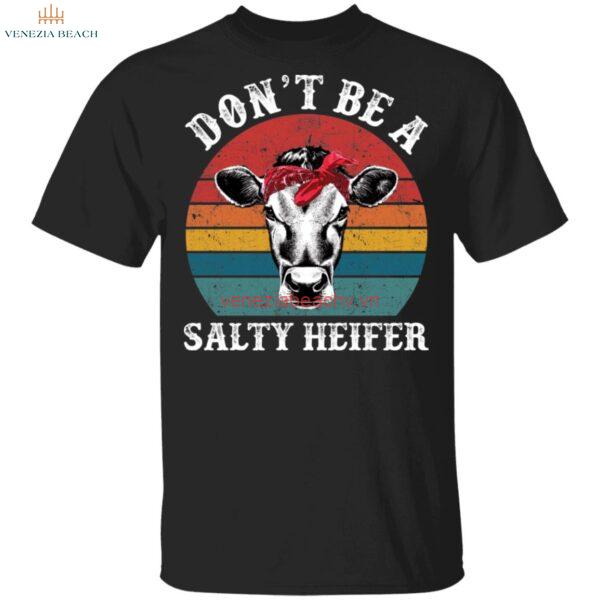Understanding the Meaning of “Don’t Be a Salty Heifer” in Everyday Conversations
Curious about the meaning of “don’t be a salty heifer” and how it fits into everyday conversations? Look no further! In this article, we will unravel the mystery behind this quirky phrase. “Don’t be a salty heifer” is an idiomatic expression that encourages us not to harbor bitterness or resentment. Join us as we explore the origins of this intriguing phrase, decode its various interpretations, and provide insights on responding when confronted with it. Discover the playful linguistic value of “don’t be a salty heifer” at Veneziabeachv.vn.
| Key Takeaways |
|---|
| • “Don’t be a salty heifer” is an idiomatic expression that means not to be bitter or resentful. |
| • The origin of the phrase is uncertain, but it is commonly used in colloquial English. |
| • The meaning of “don’t be a salty heifer” can vary depending on the context and tone of the conversation. |
| • Responding to someone who uses the phrase requires understanding the intent behind it and using humor to diffuse tension. |
| • Incorporating “don’t be a salty heifer” into everyday conversations can add a playful and witty element to interactions. |
I. Understanding the phrase ‘don’t be a salty heifer’
When it comes to deciphering the meaning of the phrase “don’t be a salty heifer,” it’s important to dive into its underlying connotations and nuances. This idiom is widely used in colloquial English to encourage someone not to harbor bitterness or resentment. The phrase employs a playful tone, using the word “salty” to indicate a negative emotional state, and “heifer” as a lighthearted reference to a female cow.
Origin and evolution
The exact origin of this peculiar phrase remains uncertain, but it has gained popularity over time, finding its way into casual conversations, both offline and online. The combination of contrasting elements – the salty disposition and the bovine reference – creates a humorous and vivid expression that adds flair to everyday interactions.
II. Exploring the meaning of ‘salty’ in modern slang
The evolution of ‘salty’ as a slang term
Over the years, the word ‘salty’ has undergone a significant transformation, emerging as a popular slang term in modern conversations. Originally associated with the taste of salt, ‘salty’ has now taken on a whole new meaning in colloquial English. In this context, ‘salty’ refers to someone who is bitter, resentful, or irritated. When used to describe a person, it implies that they are displaying negative emotions or reacting in an overly sensitive way to a situation. This slang term has gained traction and is commonly used in various social settings, especially among younger generations.
Related Post: What Does It Mean When a Deer Crosses Your Path?
Understanding the nuances of ‘salty’ in different contexts
The meaning of ‘salty’ can vary depending on the context and tone of the conversation. It can be used in a playful, lighthearted manner to poke fun at someone for being grumpy or easily annoyed. For example, if a friend teases you about losing a game, you might respond by saying, “Don’t be salty!” This usage indicates that you are not taking the teasing too seriously and encourages the other person to lighten up.
On the other hand, ‘salty’ can also be used in a more negative or confrontational way. In certain situations, it may imply that someone is harboring deep-seated bitterness or resentment. For instance, if someone continuously complains about their circumstances without taking any proactive steps to improve them, they might be described as “really salty.” This conveys a sense of dissatisfaction with life and a tendency to dwell on negative emotions.
Related Post: What Do Cracking 4s Mean?

III. Discussing the connotations of ‘heifer’ in relation to the phrase
The word ‘heifer’ in the phrase “don’t be a salty heifer” holds various connotations that contribute to the overall meaning of the expression. Let’s delve into these connotations and explore their significance:
1. Female Cattle
At its most basic level, a heifer refers to a female cow that hasn’t yet borne a calf. This association with livestock brings a sense of lightheartedness to the phrase by comparing human behavior to that of an animal. It adds a touch of playfulness to the expression that softens any potential harshness.
2. Symbolic of Stubbornness or Willfulness
In popular culture, heifers are often depicted as stubborn or willful creatures. This attribute mirrors one of the underlying messages of the phrase, reminding individuals not to hold onto bitterness or resentment. Instead, it encourages letting go of negative emotions and adopting a more open-minded and forgiving attitude.
Related post Discover the symbolic meaning of a centipede tattoo

IV. Explaining the Importance of Context and Usage in Interpreting the Phrase
When it comes to understanding the true meaning behind the phrase “don’t be a salty heifer,” context and usage play a crucial role. The beauty of idiomatic expressions lies in their ability to convey nuanced messages that may differ based on the situation and tone of the conversation.
The Role of Context in Interpreting “Don’t Be a Salty Heifer”
Context provides the backdrop for understanding the intended meaning behind “don’t be a salty heifer.” This expression is often used in a lighthearted or playful manner to advise someone not to hold onto negative emotions or grudges. For example, if a friend jokingly teases you about losing a game and says, “Don’t be a salty heifer,” it’s more of a gentle reminder not to take it too seriously and let go of any ill feelings.
Understanding Usage in Different Situations
The way “don’t be a salty heifer” is used can vary depending on the situation. It can be employed as a tongue-in-cheek remark among friends, often accompanied by laughter and camaraderie. However, it’s important to gauge the atmosphere and ensure that everyone understands and appreciates the humor. In some cases, the phrase may be used more seriously, such as in professional settings, where it serves as a reminder to maintain a positive and professional demeanor.
By carefully considering the context and usage, we can better interpret the meaning intended when someone says “don’t be a salty heifer.” It serves as a gentle way to encourage letting go of negativity and embracing a more optimistic outlook. Remember, its usage may differ from person to person and situation to situation, but ultimately, it adds a playful and witty element to everyday conversations.
V. Conclusion
Exploring the meaning behind “don’t be a salty heifer” has shed light on the nuances and humor embedded within this idiom. While its origin remains uncertain, the phrase has become a popular addition to everyday conversations in colloquial English. “Don’t be a salty heifer” serves as a reminder to embrace a lighthearted approach and avoid bitterness or resentment. Understanding the intent behind the phrase allows for appropriate responses that diffuse tension and foster a jovial atmosphere. By incorporating this idiom into our interactions, we can add a playful and witty element to our conversations. So, next time you encounter someone who tells you, “don’t be a salty heifer,” remember to embrace the humor and take it as an opportunity to bring a smile to both your faces.